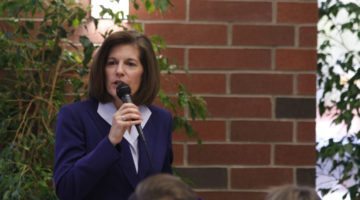By Jacob Solis
It almost goes without saying that the chaos of the 2016 election cycle came as a surprise to most observers, be they casual, professional or even politicians themselves. Regardless of the turmoil, the election has been trundling on through the start of spring, and it certainly didn’t take stop and smell the roses during spring break.
So without further ado, here’s the 2016 election cycle through this week on the state level and the national level.
State Elections

Wikimedia courtesy of American Solutions
Former Assemblywoman Sharron Angle speaks during a conference on Oct. 21, 2010. Angle lost a 2010 bid to oust Sen. Harry Reid from his Senate seat.
It’s no surprise that Nevada Sen. Harry Reid’s soon-to-be open Senate seat would be hotly contested, but the political mood exemplified by the insurgent candidacies of people like Donald Trump and Bernie Sanders seems to have complicated things.
Early on, the race seemed to be a two-way matchup between Democrat Catherine Cortez Masto and Republican Joe Heck. Cortez Masto last served as Nevada’s attorney general from 2007 to 2015 while Heck served three terms as a congressman, representing Nevada’s 3rd District, which encompasses the lower half of Clark County.
The pair each declared their intentions to run late last year, but the announcements came months before filing started and an eon before June’s primary election. However, a wrench was thrown into the Republican race on March 18 when former Nevada Assemblywoman Sharron Angle threw her hat in the ring.
Angle ran unsuccessfully for the Senate back in 2010, the last time Reid’s seat was up for grabs. It was a race that Reid, by most measures, should have lost had he run against anybody else. In the words of veteran Nevada political reporter Jon Ralston, “Many Republicans think Angle was the only GOP candidate with a pulse who could have lost to Reid.”
While Ralston went on to note that Reid’s campaign may have been strong enough to beat anybody, the same column outlines succinctly the many public relations faults and foibles of Angle’s 2010 effort, including her assertion that separation of church and state was unconstitutional and saying that a classroom full of Latino students “looked a little more Asian” to her.
In the race for a seat in the House of Representatives, the challenges are no less fierce. Heck’s run for Senate has left his seat in District 3 up for grabs, and 15 candidates have entered the fray. These candidates include everyone from Michael Roberson, the state Senate’s majority leader, to Assemblywoman Michele Fiore, notorious and often criticized for her gruff legislative style in Carson City.
Things are also heated in District 4, which was won narrowly by Republican Cresent Hardy over the incumbent Democrat Steven Horsford in 2014. Eager to turn the district blue again, eight Democrats have entered the race, including former assemblywoman and failed lieutenant governor candidate Lucy Flores and current state Sen. Ruben Kihuen.
In Districts 1 and 2, represented by Dina Titus and Mark Amodei, respectively, the competition is a little less fierce. Both incumbents are running for re-election, and history shows an affinity for the incumbent when it comes to winning elections. Add to that a small slate of candidates in District 2, and it all adds up to a decidedly tamer set of races.
National Elections

Wikimedia courtesy of Michael Vadon
Texas Sen. Ted Cruz speaks during a town hall in Henniker, New Hampshire on Wednesday, Feb. 3. Cruz is currently second place in the Republican delegate race behind real estate magnate Donald Trump, though neither has enough delegates for a lock on the nomination.
As more and more states have taken to the polls, the race for the GOP nomination has remained as murky as ever, while the race on the Democratic side has inched closer to being competitive.
On March 22, Republican voters in Arizona and Utah took to the polls, each promising sweet winner-take-all pots of delegates. At the end of the day, businessman Donald Trump took home 58 delegates from Arizona, while Texas Sen. Ted Cruz nabbed 40 in Utah.
This back-and-forth between Trump and Cruz has created a fair amount of consternation within the GOP. Though Trump has won 739 of the 1,237 delegates needed to win the nomination outright, it becomes more and more likely with each passing primary that there will be no presumptive nominee when the Republicans meet for their national convention in July.
Added to the equation is Ohio Gov. John Kasich, who’s done more to confound pundits than any other candidate thus far. The Kasich campaign has no mathematical path to the nomination, and is unlikely to pick up enough steam in a contested convention to put Kasich on the ballot come November. Some pundits, notably the team at FiveThirtyEight, have remarked that Kasich may be doing more to help Trump than himself as he draws more votes away from Cruz in winner-take-all or winner-take-most states.
On the Democratic side, Vermont Sen. Bernie Sanders gained ground in the last week, taking victories in five of the last seven states to vote. In some of those states, like Alaska and Washington, Sanders performed remarkably well, winning by margins exceeding 40 percent.
Even so, it may do little to stop the juggernaut of the Clinton campaign if Sanders can’t continue his success into the final primaries of the year. Big states like California, New York and Pennsylvania have large numbers of delegates to unload, but these delegates are handed out proportionally. This means that to nab the 2,382 delegates needed to win the nomination outright, Sanders has to win 57 percent of the vote. In New York, where Clinton leads Sanders by more than 40 points, it’s a tall order for the Sanders campaign.
With that mathematical reality, the Sanders camp has begun to reach out to unbound superdelegates, who will likely make or break his campaign. Though whether or not he can sway the more than 400 superdelegates who have already declared their support for Clinton remains to be seen.
Jacob Solis can be reached at jsolis@sagebrush.unr.edu and on Twitter @TheSagebrush.












